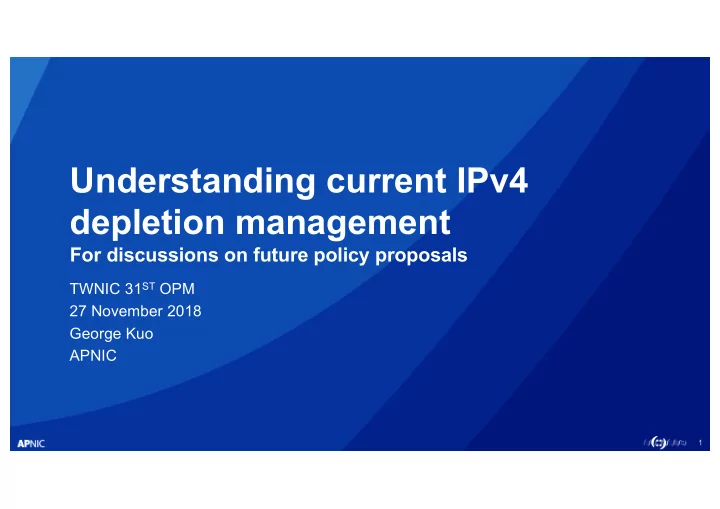

Understanding current IPv4 depletion management For discussions on future policy proposals TWNIC 31 ST OPM 27 November 2018 George Kuo APNIC 1
APNIC “A global, open, stable and secure Internet that serves the entire Asia Pacific community” 2
Policies and resource management • Policies ensure a stable, reliable and consistent framework for Internet resources management ⎯ Fair distribution ⎯ Correct and valid registrations • Policies can change ⎯ To keep up with the needs of the Internet community ⎯ eg, reduce “barriers” to get IPv6, changes to manage IPv4 depletion
Policy development • Open, transparent and bottom-up ⎯ Anyone can propose and everyone can discuss ⎯ Discussions and decisions are available publicly ⎯ The community drives policy development ⎯ www.apnic.net/policy/process • Your participation is important and essential ⎯ Your proposals help improving policies ⎯ Updated policies benefit you and the community
IP addresses delegation and management 5
IANA IPv4 depleted in February 2011 185/8 104/8 103/8 102/8 179/8
Regional IPv4 pools are being depleted 185/8 104/8 103/8 102/8 179/8
How RIR communities handle IPv4 depletion • Adopt policies for the remaining IPv4 ⎯ “Phase approach” • Reserve addresses for special purposes ⎯ IXP or unforeseen circumstances • Maintain needs based justification • Encourage IPv6 adoption and deployment • Implement IPv4 transfer policy
IPv4 transfer Inter RIR transfer Transfer within region only Transfer within region only
ARIN and RIPE regions • ARIN Exhausted the last /8 in September 2015 ⎯ Maintain a waiting list for IPv4 requests ⎯ https://www.arin.net/resources/request/waiting_list.html ⎯ Reserved space for IPv6 deployment and critical infrastructure ⎯ • RIPE NCC Exhausted the last /8 in April, 2018 ⎯ Currently delegating from the remaining recovered IPv4 pool ⎯ No waiting list ⎯ Max. allocation size is one /22 ⎯ Reserved space for temporary assignment, IXP and unforeseen circumstances ⎯
LACNIC and AFRINIC regions • LACNIC ⎯ Currently in the last phase (3) of IPv4 depletion ⎯ Delegations are from the remaining IPv4 for new members only ⎯ Delegation size from a min of a /24 up to a max /22 ⎯ Reserved space for critical infrastructure • AFRINIC ⎯ Currently at exhaustion phase 1 (max /13) ⎯ Next exhaustion phase 2 (min /24, max /22) ⎯ No waiting list ⎯ Reserved space for IXP and unforeseen circumstances
APNIC region • Currently manages two IPv4 pools ⎯ Last /8 (103/8) and recovered pools ⎯ 24% remaining in 103/8, very limited space in the recovered pool • A /16 in 103/8 reserved for unforeseen circumstances
APNIC region • 103/8 pool ⎯ Each new and existing LIR can receive from a min /24 to a max of a /22 ⎯ Can not be transferred for a period of 5 years (implemented Sep 2017) ⎯ Must return space if not needed within 5 years • Recovered pool ⎯ Provide additional space than the last /8 ⎯ Each new and existing LIR can receive from a min /24 to a max of a /22 ⎯ Approved requests are placed on the waiting list
Summary As of Nov 2018 APNIC ARIN AFRINIC LACNIC RIPE NCC Last /8 Around 24% Depleted Around 46% Depleted Depleted status remaining remaining Other /8s Depleted Depleted Small amount of Around 15% of a Around 39% of a various /8s /8 /8 Capped Min /24 N/A Up to a /13 Min /24 Min /24 delegation Max 22 Max /22 Max /22 size Waiting list Yes Yes No No No (for the recovered pool) Reserved Unforeseen Critical IXP & unforeseen Critical IXP, temporary space circumstance infrastructure & circumstance infrastructure assignment and IPv6 deployment critical infrastructure
Let’s discuss www.apnic.net/policy/participate 15
Thanks! 16
Recommend
More recommend